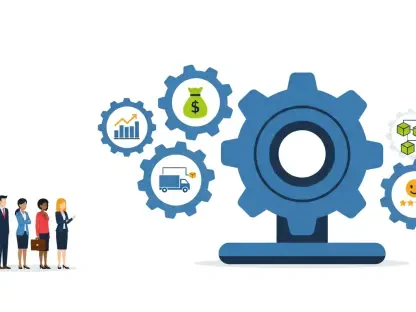In an era where digital transformation dictates competitive advantage, a staggering 90% of enterprises are racing to harness artificial intelligence (AI) to revolutionize their operations, according to a recent KPMG study. This urgency underscores a pivotal shift in the software-as-a-service (SaaS) industry, where integration with agentic AI platforms like ChatGPT, Claude, and Gemini is no longer a luxury but a necessity. The challenge lies in balancing rapid innovation with robust security, as SaaS providers grapple with exposing their application programming interfaces (APIs) to AI agents without compromising sensitive data. This report delves into the evolving landscape of SaaS-AI integration, spotlighting a groundbreaking solution that promises to bridge this gap with unprecedented safety and efficiency.
The SaaS and AI Integration Landscape: A Growing Imperative
The SaaS industry stands at a transformative crossroads, fueled by exponential growth and an insatiable demand for smarter, more adaptive solutions. With businesses increasingly relying on cloud-based applications to streamline operations, the market has seen a surge in adoption, driven by the need for scalability and cost efficiency. Concurrently, AI technologies have emerged as a game-changer, offering capabilities that range from predictive analytics to natural language processing, fundamentally altering how SaaS platforms deliver value to end-users.
Integration with agentic AI platforms represents the next frontier for SaaS providers, as these tools enable dynamic, conversational interactions that enhance user experience and operational workflows. Major players like Microsoft, Google, and Anthropic are leading the charge with platforms such as ChatGPT, Gemini, and Claude, respectively, pushing the boundaries of what AI can achieve. However, the demand for secure integration solutions has intensified, as companies recognize the risks of unchecked AI access to critical systems, propelling innovators to develop technologies that ensure both functionality and protection.
Technological drivers, including advancements in machine learning and API connectivity, are accelerating this trend, while market leaders compete to offer seamless yet safe integration frameworks. The growing user preference for AI-driven interactions has created a pressing need for SaaS providers to adapt quickly or risk obsolescence. As a result, the industry is witnessing a race to establish secure, scalable solutions that can meet these evolving expectations without sacrificing data integrity or operational stability.
Understanding the AI Adoption Surge in SaaS
Key Trends Shaping the Industry
A powerful wave of enthusiasm for AI adoption is sweeping through enterprises, with a KPMG study revealing that 90% of organizations are eager to integrate these technologies into their core operations. This urgency stems from the recognition that AI can drive unparalleled innovation, from automating routine tasks to providing deep insights through data analysis. For SaaS providers, the integration of agentic platforms offers a direct path to meeting consumer demands for intuitive, responsive tools that mimic human interaction.
Consumer preferences are shifting markedly toward agentic AI platforms, which offer personalized and conversational experiences that traditional SaaS tools often lack. This trend is spurring SaaS companies to rethink their offerings, embedding AI to stay relevant in a crowded market. The role of AI in fostering innovation cannot be overstated, as it enables features like real-time decision-making and adaptive learning, which are becoming standard expectations among users.
Amid these advancements, significant market opportunities are emerging for secure integration tools that can facilitate AI adoption without exposing vulnerabilities. As enterprises prioritize both speed and safety, solutions that provide robust control mechanisms are gaining traction. The industry is ripe for tools that can navigate the complexities of AI integration, ensuring that SaaS providers can capitalize on this technological wave while mitigating associated risks.
Market Insights and Growth Potential
Despite the enthusiasm for AI, substantial barriers remain, with 82% of business leaders citing risk management as a primary concern, per the same KPMG study. Issues such as data breaches, unauthorized access, and unpredictable AI behavior loom large, creating hesitation among organizations otherwise ready to embrace these tools. This tension highlights a critical gap in the market for solutions that address security without stifling innovation.
Projections indicate that SaaS-AI integrations will see robust growth over the next few years, with an increasing number of providers seeking secure pathways to connect with agentic platforms from this year through 2027. Analysts anticipate a surge in demand for solutions that offer fine-tuned access controls and real-time monitoring to prevent misuse. The market for secure integration tools is expected to expand as more SaaS companies recognize the necessity of safeguarding their APIs while leveraging AI capabilities.
Looking ahead, platforms that prioritize security alongside ease of integration are poised to shape market dynamics significantly. Innovative solutions that offer both rapid deployment and stringent protective measures will likely become industry standards. This forward-looking perspective suggests that tools addressing these dual needs will play a pivotal role in defining how SaaS providers adapt to the AI-driven future.
Challenges in SaaS-AI Integration: Balancing Innovation and Risk
The rapid adoption of AI within SaaS environments presents a dual-edged sword, where the promise of cutting-edge functionality must be weighed against inherent risks. Exposing APIs to AI agents, while essential for enabling advanced features, opens potential vulnerabilities that could lead to data leaks or system disruptions. SaaS providers face the daunting task of accelerating integration without inadvertently compromising their platforms.
Security concerns are paramount, with unauthorized data access and rogue AI behavior ranking among the most pressing obstacles. AI agents, if not properly controlled, can execute actions beyond their intended scope, potentially causing operational chaos or exposing confidential information. These risks are compounded by the complexity of managing interactions between diverse AI models and SaaS ecosystems, necessitating a cautious approach to deployment.
To address these challenges, implementing robust control layers and guardrails is essential. Strategies such as real-time monitoring, strict access permissions, and automated shutdown mechanisms for erratic AI behavior can mitigate dangers. Additionally, fostering a culture of continuous risk assessment ensures that SaaS providers remain agile in responding to emerging threats, paving the way for safer innovation in this dynamic space.
Regulatory and Security Considerations for SaaS-AI Integration
Navigating the regulatory landscape is a critical aspect of SaaS-AI integration, as data protection and compliance standards grow increasingly stringent. Frameworks like the General Data Protection Regulation (GDPR) and the California Consumer Privacy Act (CCPA) impose strict guidelines on how data is handled, particularly when AI agents process sensitive information. SaaS providers must ensure that their integrations adhere to these mandates to avoid legal repercussions.
Security measures such as fine-grained authorization and human-in-the-loop approvals are vital for maintaining compliance while enabling AI interactions. These mechanisms ensure that only authorized actions are executed and that critical decisions receive human oversight, reducing the likelihood of errors or misuse. Moreover, data masking and encryption techniques further bolster protection, safeguarding information as it moves between SaaS platforms and AI agents.
Solutions that align with industry best practices offer a pathway to safe and compliant AI interactions, setting a benchmark for others to follow. By embedding comprehensive security protocols, such tools not only mitigate risks but also build trust among users and regulators. This alignment with established standards is crucial for fostering confidence in SaaS-AI integrations across diverse sectors.
The Future of SaaS-AI Integration: Opportunities and Innovations
The evolution of SaaS-AI integration holds immense potential, with advancements in agentic AI platforms expected to introduce even more sophisticated capabilities. Future iterations of AI models may offer enhanced contextual understanding and decision-making prowess, further enriching SaaS applications. Concurrently, improvements in security protocols will likely keep pace, ensuring that these innovations do not come at the expense of safety.
Emerging disruptors, such as novel AI architectures or unexpected regulatory shifts, could reshape the industry landscape in unforeseen ways. New entrants with cutting-edge AI models might challenge existing players, while evolving compliance requirements could mandate stricter controls. SaaS providers must remain vigilant, adapting to these changes to maintain a competitive edge in a rapidly shifting market.
Innovative tools that enable secure and scalable integrations are set to drive future growth, offering a blueprint for how the industry can progress. By addressing both technical and regulatory challenges, such solutions pave the way for widespread adoption of AI within SaaS ecosystems. This trajectory suggests a future where seamless, safe interactions between SaaS platforms and AI agents become the norm, unlocking new avenues for efficiency and creativity.
Conclusion
Reflecting on the insights gathered, it becomes evident that the push for SaaS-AI integration has reached a critical juncture, demanding solutions that harmonize innovation with security. The challenges of data protection and rogue AI behavior are being met with promising advancements, highlighting a path forward for enterprises eager to leverage AI’s potential. This exploration underscores the urgency for robust frameworks that can support rapid adoption without exposing vulnerabilities.
Looking ahead, SaaS providers are encouraged to prioritize scalable, secure integration tools as a cornerstone of their AI strategies. Embracing solutions with comprehensive control mechanisms and compliance features proves essential for navigating the complexities of this technological shift. By investing in such innovations, companies position themselves to thrive in an increasingly AI-driven market.
The industry stands to benefit from collaborative efforts to refine security standards and share best practices, ensuring that future integrations build on past lessons. Stakeholders are urged to monitor emerging trends and regulatory developments closely, adapting swiftly to maintain trust and operational integrity. This proactive stance promises to transform challenges into opportunities, setting a foundation for sustained growth in the SaaS-AI synergy.









